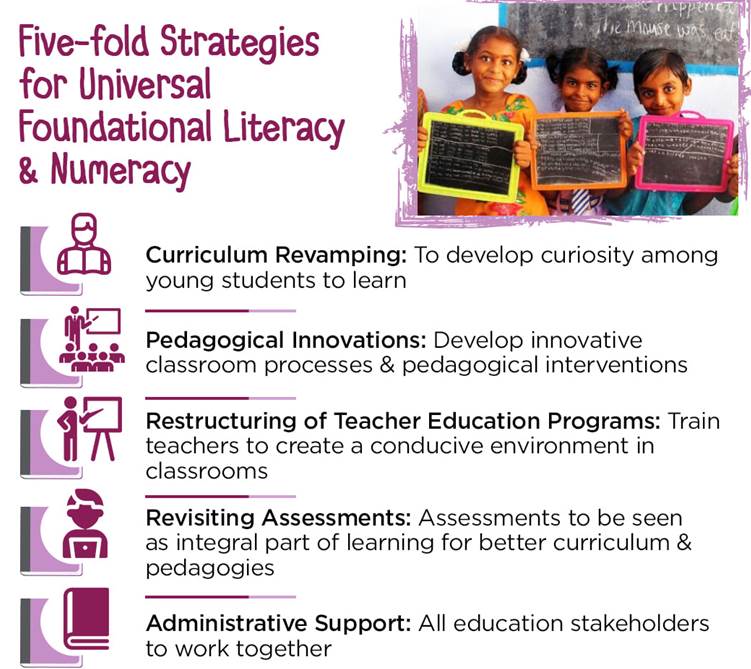Description

Copyright infringement not intended
In News
- A study carried out jointly by the Union Ministry of Education and the National Council of Educational Research and Training (NCERT) has found that;
- 37% of Class III students have “limited” foundational numeracy skills, such as identifying numbers.
- 11% “lack the most basic knowledge and skills”.
- 15% lacked “basic skills” in English.
- 30% were found to have “limited skills”.
- The Union Education Minister stated that “80-90% of the brain develops by the time a child is 6-7 years old. That is why the focus on building a strong foundation for better growth, development and learning in early years becomes one of the most important indicators for the development of a productive and efficient human capital”.
Details
- The conclusions of the Foundational Learning Study (FLS) were based on one-to-one interviews with each participant.
- Depending on their performance, the students were categorized into 4 groups:
- Those who lacked the most basic knowledge and skills.
- Those who had limited knowledge and skills.
- Those who had developed sufficient knowledge and skills.
- Those who had developed superior knowledge and skills.
- According to the report, the findings will set the baseline for NIPUN Bharat (National Initiative for Proficiency in Reading with Understanding and Numeracy).

National Initiative for Promoting Upskilling of Nirman workers (NIPUN)
- The Minister of Housing & Urban Affairs has launched the “NIPUN” initiative to provide skill training to construction workers.
- National Initiative for Promoting Upskilling of Nirman workers (NIPUN) initiative is launched under the Deendayal Antyodaya Yojana-National Urban Livelihoods Mission (DAY-NULM) to train over 1 lakh construction workers.
- The Minister also interacted with some construction workers and presented them with safety helmets.
- It will provide skills to workers and help them to adopt future trends in the construction industry.
- It will also increase their capabilities and diversify their skill sets.
Related News
- Recently the Union Government has approved the 'New India Literacy Programme, a new scheme of Adult Education for FYs 2022-27”.
- New India Literacy Programme for the period FYs 2022-2027 to cover all the aspects of Adult Education to align with National Education Policy 2020 and Budget Announcements 2021-22.
- The National Education Policy 2020 has recommendations for Adult Education and Lifelong Learning.
Objectives of the Scheme
- To Provide Foundational literacy and numeracy.
- Promote Critical life skills: Financial literacy, Digital literacy, Commercial skills, Health care and awareness, Child care and education, and Family welfare.
- The scheme will cover non-literates of the age of 15 years and above in all states/UTs in the country.
- To cover 5 crore learners (1 crore per year) by using the “Online Teaching, Learning and Assessment System (OTLAS)” in collaboration with National Informatics Center.
Features of the Scheme
- The term “Adult Education” is to be replaced with “Education For All”.
- The scheme will be implemented through volunteerism through online mode.
- Training, and workshops of volunteers, may be organized through face-to-face mode.
- All materials and resources shall be provided digitally.
- Different strategies are to be adopted for different age groups. Flexibility for States/UTs will be provided to undertake innovative
- Performance Grading Index (PGI) for State/UT and district level will show the performance of States and UTs on yearly basis by weighing both the physical and financial progress through the UDISE portal.
- Priority under the Literacy programme:
- The age group of 15-35 years will be saturated first.
- Priority will be given to the Girls and women.
- SC/ST/OBC/Minorities, Persons with Special Needs (Divyangjans), Marginalized/ Nomadic/ construction workers/ laborers/etc.
- The focus shall be on all aspirational districts of NITI Aayog, districts with literacy rates less than the National/State average, and districts with female literacy rates less than 60% as per the 2011 Census.
https://indianexpress.com/article/education/study-11-of-class-3-kids-lack-basic-maths-skills-37-have-limited-skills-8135257/
https://t.me/+hJqMV1O0se03Njk9













